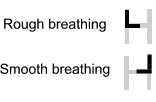Greek does not have a letter "H," but it does have an "H" sound. The sound can be found in three "double letters": theta, chi, phi (th, ch, and ph). The other place where the "H" sound can be found is at the beginning of words that begin with a vowel. If such a word has an "H" sound, a rough breathing mark is written over the vowel; if no "H" sound is present, a smooth breathing mark is written over the vowel. Any word beginning with the letter "r" carries a rough breathing mark and is transliterated as "rh."
The 'H' sound is produced
by a more forceful escape of air at the beginning of sounding the word.
Often, the way the 'H' sound is handled is one of the more distinctive features
of a dialect. In fact, Greek once used the letter 'H' for the 'H' sound,
but the Greek dialect that became standard did not sound the 'H,' and they
used the letter 'H' for the long 'E' sound (what is the letter eta in Greek).
Remnants of the use of the letter 'H' can be seen in the shape of the rough
and smooth breathing marks.

![]()
In Newfoundland, for example, frequently words beginning with the letter
'H' will be pronounced without the initial 'H' sound and words beginning
with a vowel will be pronounced as though they started with the letter 'H.'
That kind of dialectical peculiarity is illustrated well in the play "Pygmalion"
and the movie version "My Fair Lady," in which Eliza Dolittle
is unable to detect her improper use of the 'H' sound until Professor Higgins
places a gas lamp in front of her, telling her she is pronouncing the 'H'
sound only if the lamp flickers.
![]()
Try pronouncing the words "and" and "hand" or "ill"
and "hill" or "it" and "hit." Place your hand
close to your mouth so that you can feel when air escapes. Notice the effect
of the 'H' sound.
![]()
- All words beginning with a vowel will have either a rough or a smooth breathing mark.
- All words beginning with the consonant 'R' (rho) have a rough breathing mark over the rho.
- Sometimes prepositions
and conjunctions that end in a vowel will drop their final vowel when
they are followed by a word that begins in a vowel. Note whether that
word that follows has a rough or smooth breathing mark. If a rough breathing
mark, then the 'H' sound from the rough breathing mark may be added to
the sound of the contracted preposition if the contracted preposition
ends in a consonant that could be expressed with an 'H' sound.

![]()
All words that start
with a 'U' (upilson) or an 'R' (rho) in Greek have a rough breathing mark.



